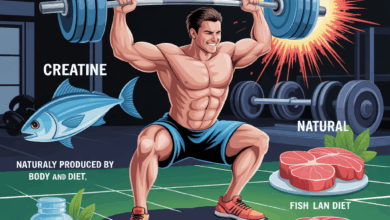What Are Supplements in Sport and Fitness: A Practical Guide for Real Results

Ever stood in the supplement aisle wondering which tub will actually help you hit a new PR or power through a long run — and which is just marketing? If you’ve ever asked yourself “what are supplements in sport and fitness, and do I really need them?” you’re not alone. This guide breaks down the essentials so you can make evidence-based choices that support your goals.
Why athletes and fitness enthusiasts use supplements
Supplements are concentrated sources of nutrients or compounds designed to complement your diet and training. People use them to: support recovery, increase strength or endurance, fill nutrient gaps, or aid with hydration and energy. Think of supplements as targeted helpers — not magic bullets. The foundation should always be whole foods, sleep, and consistent training.
What are supplements in sport and fitness — common types and how they work
Below are the most common categories of sports and fitness supplements, what they do, and who might benefit.
Protein powders and meal supplements
- What they do: Provide high-quality protein to support muscle repair and growth.
- When to use: Post-workout or to meet daily protein needs when whole foods are insufficient.
- Real-world example: A busy parent who trains in the evening uses a whey shake post-lift to hit their protein target.
Creatine
- What it does: Increases phosphocreatine stores in muscle, improving short, high-intensity efforts and aiding strength gains.
- Who benefits: Strength athletes, sprinters, and anyone doing resistance training.
- Tip: 3–5 g daily is a common, well-researched dose.
Pre-workouts and caffeine
- What they do: Boost focus, alertness, and performance for high-intensity or long training sessions.
- Use with caution: Check tolerances and avoid late-day use to prevent sleep disruption.
Electrolytes and carbohydrate fuels
- What they do: Maintain hydration and energy during long endurance events (running, cycling).
- Real-world example: A marathoner uses a sports drink or gels during runs over 60–90 minutes to prevent bonking.
Vitamins, minerals and targeted nutrients
- Examples: Vitamin D, iron, omega-3s, magnesium.
- Why they matter: Deficiencies can impair performance and recovery; targeted supplementation corrects gaps identified by testing or risk factors (e.g., female endurance athletes and iron).
How to choose supplements safely and effectively
Choosing supplements wisely reduces waste and risk. Follow these steps:
- Start with goals: Strength, endurance, recovery, or general health?
- Prioritize diet and training: Supplements support, not replace, solid nutrition and program design.
- Look for third-party testing where possible (quality assurance) and follow label directions.
- Consult a qualified professional if you have medical conditions or take medications.
Practical tips for beginners
- Begin with one or two evidence-backed options (protein and creatine are a common starting pair).
- Track results for 4–12 weeks to determine if a supplement is helping.
- Stay hydrated and prioritize sleep for better absorption and recovery.
How supplements fit into different training goals
Here are simple, actionable stacks and workout variations depending on your goal.
Goal: Build strength and muscle
- Supplements: Creatine monohydrate (3–5 g/day), protein powder (to meet daily needs), omega-3s for joint health.
- Workout variation: Focus on compound lifts (squats, deadlifts, presses) 3–4x/week using progressive overload.
- Nutrition tip: Aim for a modest calorie surplus with ~1.6–2.2 g protein/kg bodyweight.
Goal: Improve endurance
- Supplements: Carbohydrate fuels during workouts, electrolytes, and possibly beta-alanine for buffering in high-intensity efforts.
- Workout variation: Mix long slow distance runs with tempo intervals and VO2-style intervals weekly.
- Practical tip: Practice race-day fueling strategy during long training sessions.
Goal: Lose fat while keeping muscle
- Supplements: Protein to preserve lean mass, caffeine for appetite and performance, and a multivitamin if diet is restricted.
- Workout variation: Combine resistance training 3x/week with higher-intensity interval sessions and steady-state cardio.
- Lifestyle advice: Maintain sleep and daily protein to reduce muscle loss.
Dos and don’ts: safe supplement use
- Do prioritize whole foods and a balanced diet first.
- Do check ingredient lists and avoid proprietary blends that hide doses.
- Don’t assume more is better — follow recommended doses.
- Do cycle stimulants (like strong pre-workouts) to avoid tolerance and sleep disruption.
Frequently Asked Questions
No — beginners benefit most from consistent training, adequate protein from food, and good sleep. Targeted supplements (e.g., protein powder, creatine) can speed progress or make nutrition easier, but they aren’t required to see gains.
Start by defining your goal, review evidence for supplements that support that goal, and consider testing (like bloodwork) for deficiencies. Speak with a nutritionist or sports dietitian if you’re unsure.
When used correctly, most common sports supplements are safe. Risks increase with high doses, unknown ingredients, or interactions with medications. Choose reputable brands and consult a healthcare professional if in doubt.
Putting it all together — realistic next steps
Understanding what are supplements in sport and fitness helps you use them as tools — not crutches. Start with a solid training plan, prioritize whole-food nutrition, choose one or two evidence-backed supplements based on your goals, and track progress. For example, if you’re a beginner lifter: focus on a progressive resistance program, add a daily protein shake if needed, and take 3–5 g creatine. If you’re training for a half-marathon: practice carbohydrate fueling and electrolytes on long runs and prioritize iron and vitamin D monitoring.
Ready to turn knowledge into action? Check out our workout routines to pair the right training with the right supplements, browse our nutrition guides for food-first strategies, and explore wellness tips to optimize sleep and recovery.
Conclusion
So, what are supplements in sport and fitness? They are targeted nutritional aids that can support your performance, recovery, and health when used appropriately. Remember: food-first, goal-oriented choices, and safety matter most. Try one evidence-backed supplement at a time, measure your results, and adjust. If you found this helpful, sign up for our newsletter or dive into a training plan from the workout routines page — your next PR could be closer than you think.





